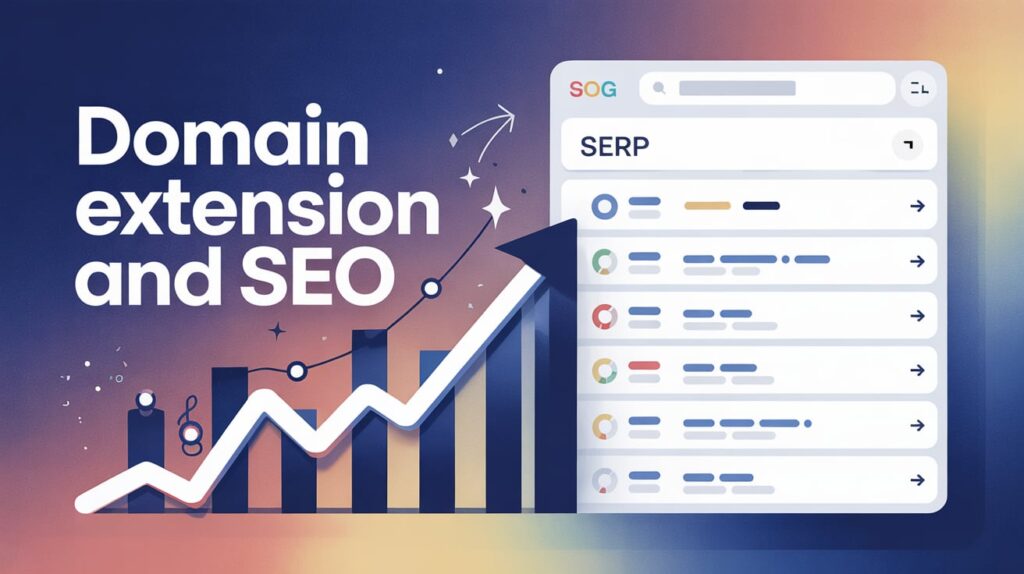Introduction: Why Your Domain Extension Matters for SEO
Choosing the right domain name is crucial for your website’s success, but many website owners overlook the importance of their domain extension (also called a top-level domain or TLD).
Your domain extension (like .com, .org, or .io) can impact:
✅ Search engine rankings
✅ User trust and click-through rates
✅ Brand perception
✅ Local SEO performance
In this guide, we’ll break down everything you need to know about domain extensions and SEO, including:
- How domain extensions affect search rankings
- Which TLDs are best for SEO
- When to use country-specific domains (ccTLDs)
- Common myths about domain extensions
- Best practices for choosing the right TLD
By the end, you’ll know exactly which domain extension will give your website the best chance of ranking high in Google.

What Are Domain Extensions? (Quick Definition)
A domain extension is the suffix at the end of a web address, such as:
- .com (commercial)
- .org (organization)
- .net (network)
- .io (tech startups)
- .co.uk (UK-based sites)
There are two main types of domain extensions:
- gTLDs (Generic Top-Level Domains) – Global extensions like .com, .org, .net
- ccTLDs (Country-Code Top-Level Domains) – Local extensions like .de (Germany), .fr (France), .ca (Canada)
Does Domain Extension Affect SEO? (What Google Says)
Google’s John Mueller has stated that domain extensions do not directly impact rankings. However, they indirectly influence SEO in several ways:
1. User Trust & Click-Through Rates (CTR)
- .com domains are the most trusted (users are more likely to click on them).
- Unusual extensions (like .xyz or .biz) may appear spammy, hurting CTR.
2. Local SEO Benefits (ccTLDs)
- If you target a specific country, a ccTLD (.uk, .de, .au) can boost local rankings.
- Example: A .de domain will rank better in Germany than a .com.
3. Brand Perception & Memorability
- Startups often use .io or .ai to stand out in tech niches.
- Nonprofits prefer .org for credibility.
4. Spam Risk with New/Uncommon TLDs
- Some newer TLDs (like .guru, .shop) are overused by spammers, which may affect trust.

Best Domain Extensions for SEO in 2024
| Extension | Best For | SEO Impact |
|---|---|---|
| .com | Global businesses, eCommerce | Highest trust, best for branding |
| .org | Nonprofits, charities | Strong credibility |
| .net | Tech companies, networks | Good alternative to .com |
| .io | Tech startups, SaaS | Trendy but less trusted than .com |
| .co | Startups, alternative to .com | Rising in popularity |
| Country TLDs (.uk, .de, .ca) | Local businesses | Boosts local SEO |
| New TLDs (.app, .blog, .shop) | Niche sites | Can work but may raise spam flags |
Best Choice for Most Websites?
👉 .com (if available) – It’s the most trusted and memorable.
When to Use a Country-Specific Domain (ccTLD)
If your business operates primarily in one country, a ccTLD (like .uk or .de) can help with:
✅ Better local rankings (Google favors ccTLDs for local searches)
✅ Higher trust from local customers
✅ Clear geographic targeting in Google Search Console
Example:
- A bakery in France should use .fr instead of .com.
- An Australian law firm should use .com.au.
⚠️ Warning: If you use a ccTLD but want to rank globally, Google may limit your visibility outside that country.
ALSO CHECK: What Is AI and How Does It Make Our Daily Life & Work Easier?
Worst Domain Extensions for SEO (Avoid These!)
Some TLDs are associated with spam, which can hurt your site’s credibility:
❌ .biz – Often used by low-quality sites
❌ .info – Historically spam-heavy
❌ .xyz – Popular with spam domains
❌ .guru / .club / .top – Can look unprofessional
Exception: If you build a strong brand (like abc.xyz by Google’s parent company Alphabet), you can overcome this bias.
Myths About Domain Extensions & SEO
❌ Myth 1: “New TLDs (.shop, .app) Rank Lower”
- Reality: Google says they don’t penalize new TLDs, but user trust varies.
❌ Myth 2: “Exact-Match Domains (.bestplumber.com) Rank Higher”
- Reality: Google’s 2012 EMD update reduced the advantage of exact-match domains.
❌ Myth 3: “Hyphenated Domains (best-plumber.com) Hurt SEO”
- Reality: They don’t directly hurt rankings but can look spammy.
How to Choose the Best Domain Extension for SEO
Follow these steps to pick the right TLD:
- If available, always choose .com (most trusted).
- For local businesses, use a ccTLD (.uk, .de, .ca).
- For startups, consider .io or .co (but .com is still better).
- Avoid spammy-looking TLDs (.biz, .info).
- Keep it short and brandable (avoid hyphens/numbers).

Final Verdict: Does Domain Extension Impact SEO?
Directly? No. Google doesn’t rank .com higher than .net just because of the extension.
Indirectly? Yes. The right domain extension can:
✅ Improve click-through rates (CTR)
✅ Boost local SEO (if using ccTLD)
✅ Enhance brand trust
So, choose wisely!
Need Help Picking a Domain?
Use tools like:
- Namecheap (domain search)
- LeanDomainSearch (find available names)
- Google Trends (check TLD popularity)
What’s your domain extension? Share in the comments! 🚀


Your article helped me a lot, is there any more related content? Thanks!
Thanks for sharing. I read many of your blog posts, cool, your blog is very good.